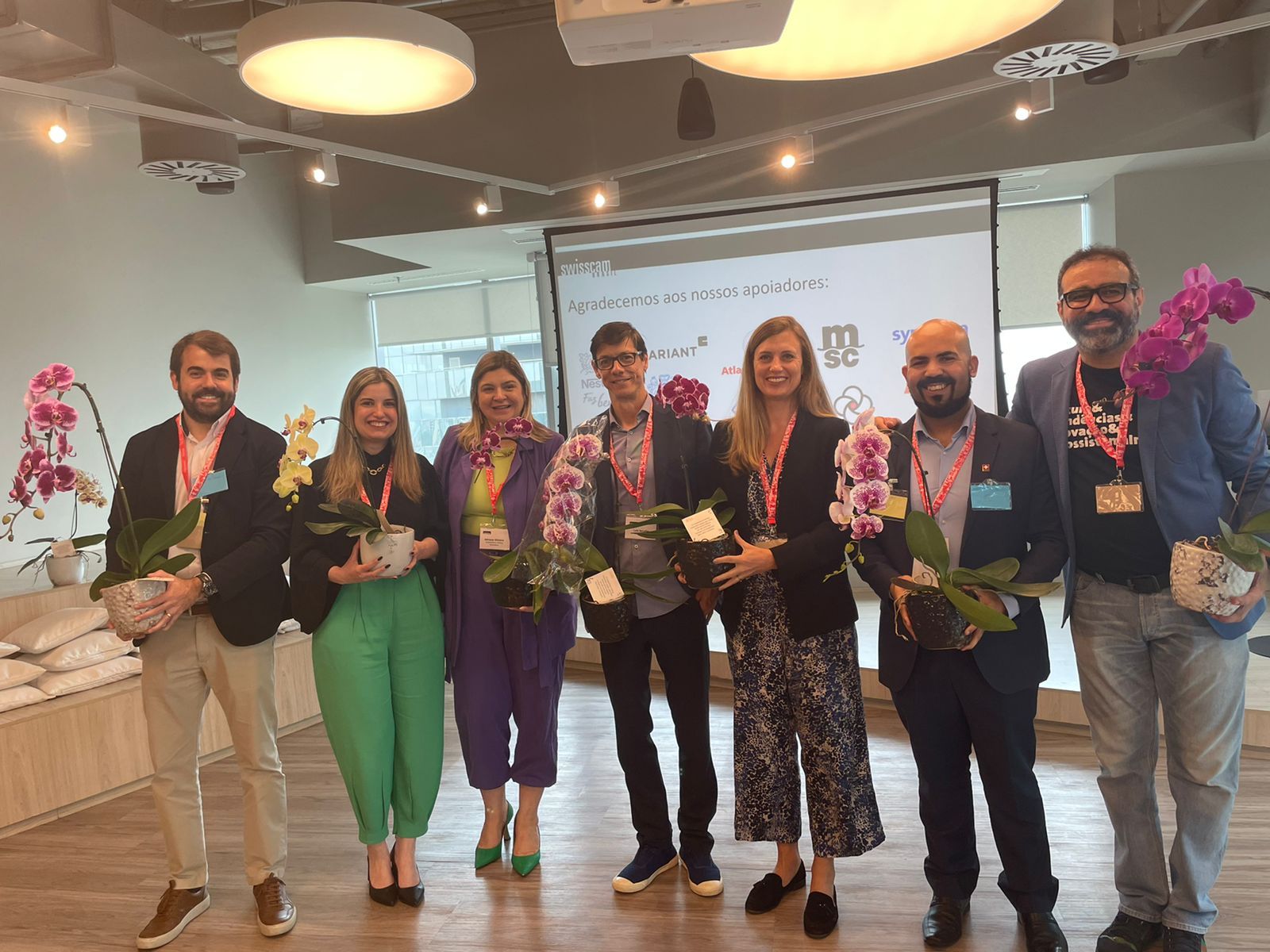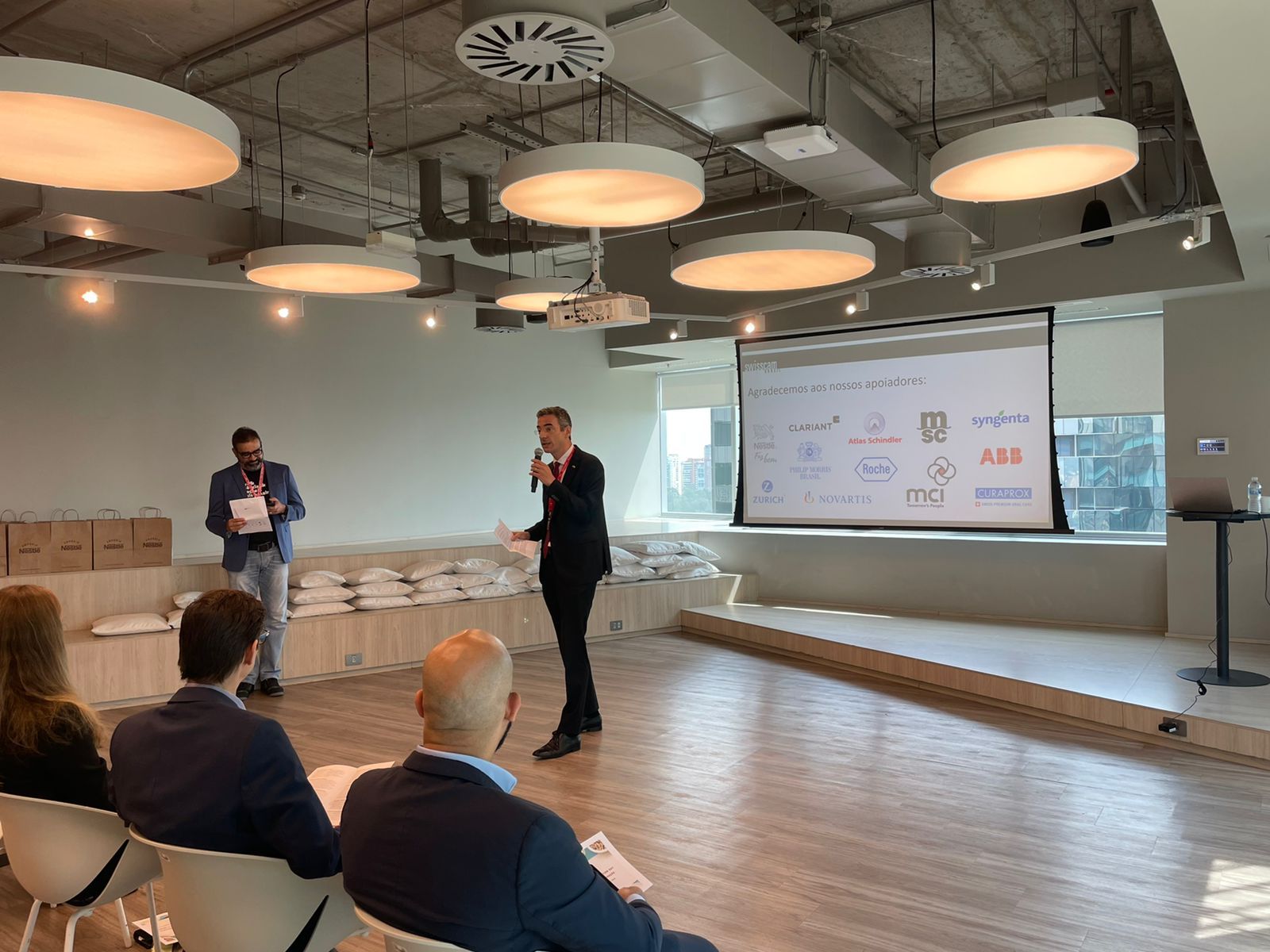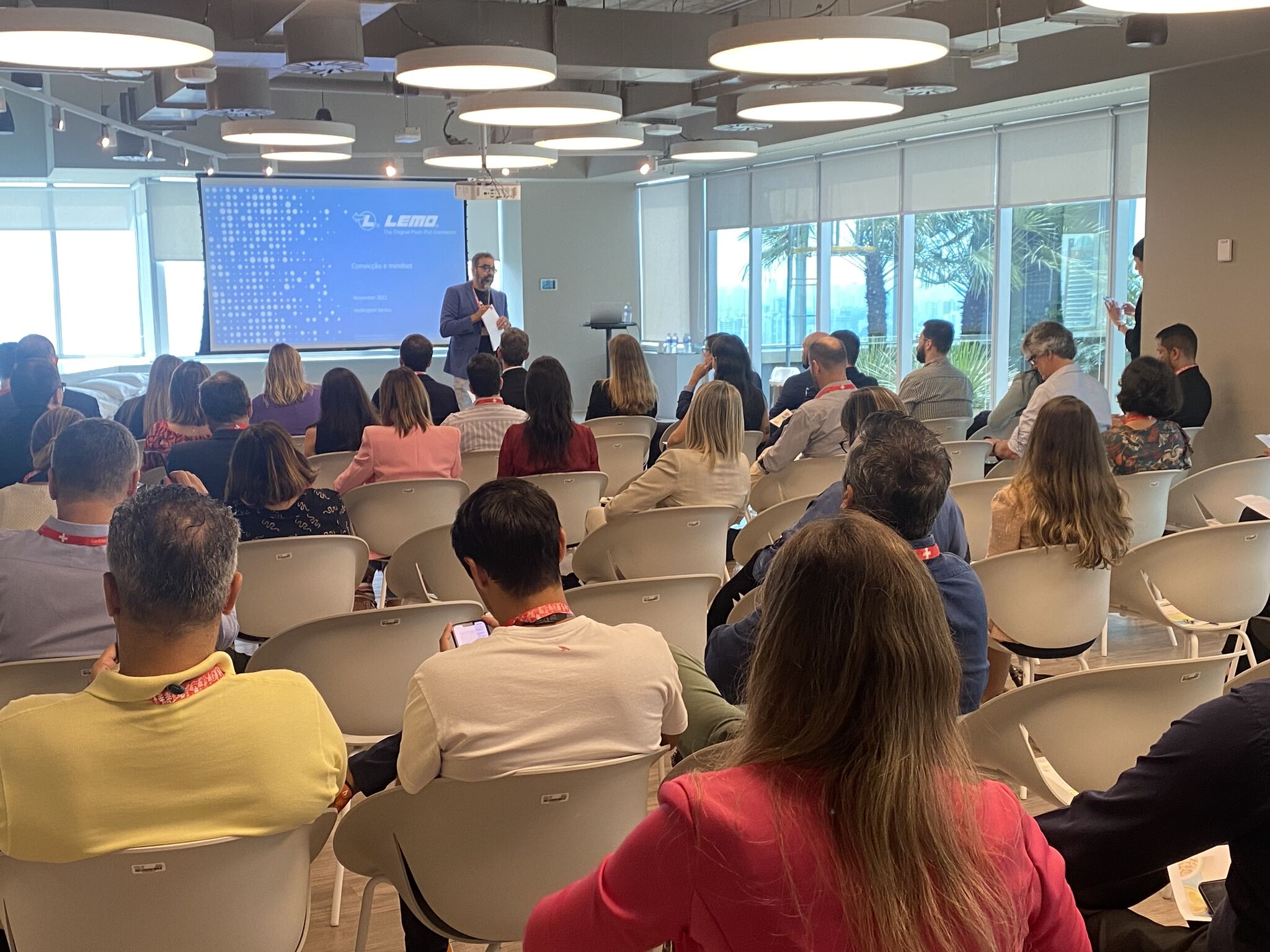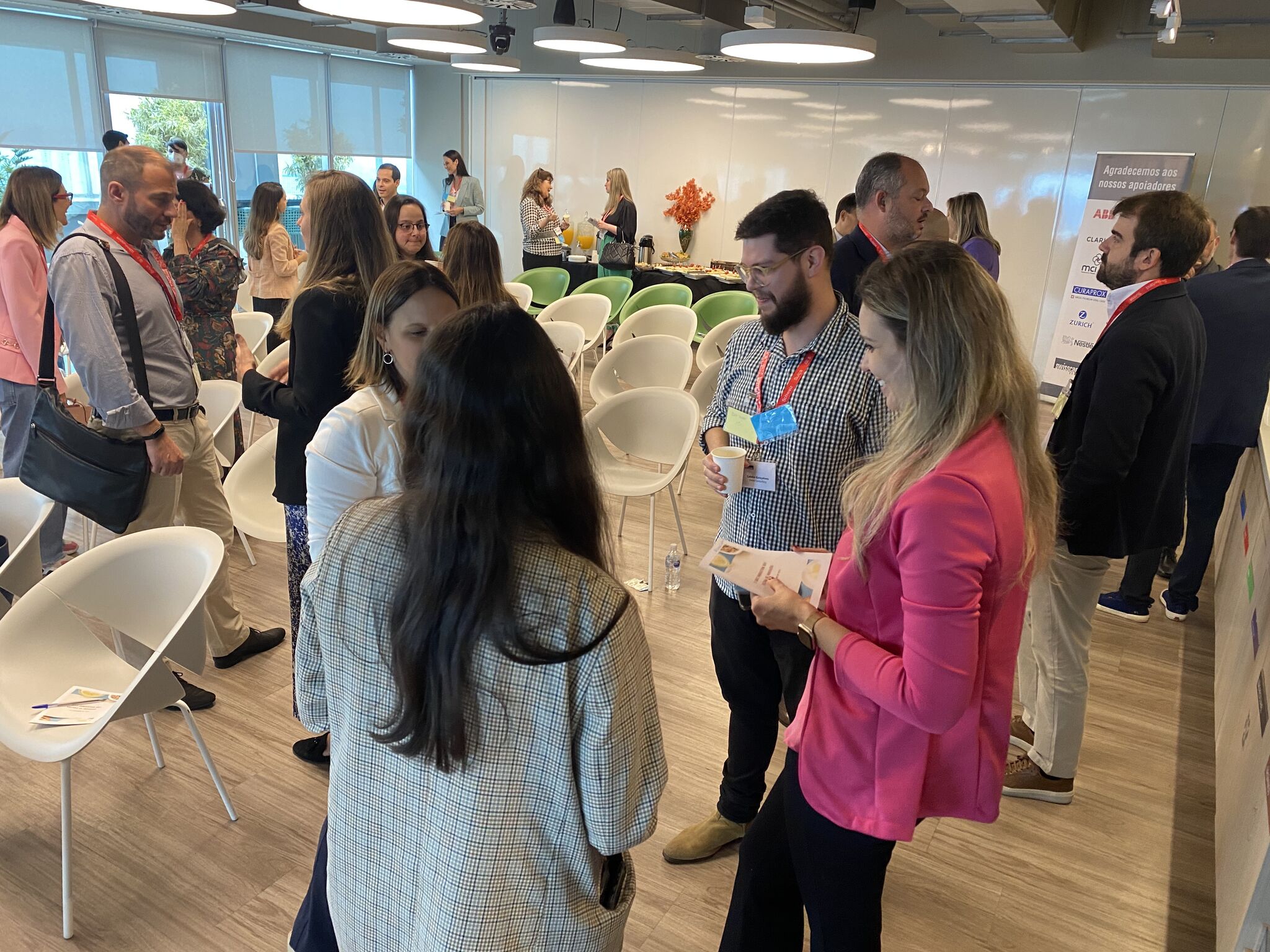On November 11th, the SWISSCAM Innovation Committee, coordinated by Marcelo Veras, organized the second edition of the Swiss Innovation Day in a space kindly provided by Nestlé.
There is still a worldwide debate about what makes a company innovative. After all, what ingredients are necessary to have an innovative culture? Meet each of them below, presented by our eight guest experts.
Ingredient 1: Conviction and mindset
Wellington Santos, Sales and Marketing Manager at Lemo Latin America
Graduated in electrical engineering from UNIVAP and MBA in business management from UNITAU, with specializations in Digital Marketing from the University of Illinois/USA and Design Thinking/Innovation from the University of Virginia/USA. At LEMO, he leads the “Go to the market” in Latin America, with success stories in different market segments, such as professional audio & video, aeronautics, medical-hospital and others, always having innovation as the key to success in operations from the company.
“Thinking creatively but not being able to execute is like having a good car without gas.” To illustrate his speech, Wellington compared innovation with a Formula I car, where the fuel that makes it go is conviction. Communicating with conviction can save a breakthrough idea. It reduces the impact of fear on decision-making. Innovative thinking requires: mindset, skillset and toolset.
Leaders with conviction inspire the team. So it happened with the founder of Lemo, Léon Mouttet, who with the invention of the Push-Pull, solved the problems of cable disconnection in Swiss telephone exchanges, becoming a world standard for the entire electronics industry to this day.
Ingredient 2: Future Agenda and Trends
Malin Borg, CEO of Swissnex Brazil
She holds a master’s degree in International Relations from The Graduate Institute, in Geneva, and a degree from the University of St Andrews, United Kingdom. As CEO of Swissnex in Brazil, her mission is to support agents in the areas of education, research and innovation with partnerships between Switzerland and Brazil.
Trends are external factors that have an impact on our work, such as social and environmental issues. Malin stressed the importance of being aware of these trends and having a mindset focused on thinking about what comes in the future and not getting stuck in what has already been done. What’s to come could have a direct impact and perhaps change the business model.
She also emphasized the application of these concepts within the company. Stuck in the hectic routine of everyday life, sometimes we don’t reserve enough time to think about what’s going on outside our little box. Swissnex organizes learning moments bringing subjects that in principle have nothing to do with the business, but which in the future may impact our work. It also promotes the connection between people from different departments and specialties, as well as between startups and companies, in addition to academia. She brougt as an example the Curacycle project carried out in partnership with Curaprox, where a workshop brought together designers, artists and engineers to think about sustainable solutions for toothbrushes. “If you join scientists with artists, something very interesting can come out”.
Ingredient 3: Attracting and Retaining Innovative Professionals
Daniel Pedrozo, Head of Innovation Seeeds at Syngenta
Graduated in Information Systems from the Federal University of the State of Rio de Janeiro, he has an MBA in Leadership, Innovation and Management 3.0 from PUC-RS, in addition to courses in Digital Transformation from the Boston Questrom School of Business (BUx) and Innovation by Singularity and Stanford Universities.
Syngenta recognizes that its greatest success factor is its people. And it is with this in mind that it increasingly seeks to be a company recognized by them, where they can feel represented, empowered, in a safe environment, being able to scale their purpose. Being a customer-centric company therefore supports your team to feel like your customers. Syngenta’s motto is: We are all producers!
Daniel presented virtual reality as a useful training tool, which allows scaling access and providing learning more quickly, in addition to understanding complexities and increasing interaction with the company’s processes and challenges.
Ingredient 4: TIT – Transversal Innovation Team
Adriana Delafina de Oliveira, People & Management Leader at CVH – Cooperativa Veiling Holambra
Postgraduate in Business Administration with emphasis in Marketing, MBA in Finance and People Management and Leadership in Innovation MIT. She is a TrendsInnovation Advisor, Post-MBA TrendsInovation, Master Neurobusiness and Master Coach. She is also responsible for managing the Cooperative’s Strategic Business Plan, aligning culture and organizational strategies, where she is also in charge of the Integrated Management System.
In a transversal team, one complements the other. What skills are needed to contribute to a transversal team? According to Adriana, self-awareness, empathy, curiosity and experimentation.
The co-creation process in an TIT involves the following steps, which make team members feel more comfortable to contribute: just cause (what is the purpose); trust the process; non-judgmental (every speech must be considered); reliable team; existential flexibility (open your eyes and know how to give in to your own convictions); worthy competitors (with each other and not against each other); courage to lead and leave your legacy.
Ingredient 5: Innovation Process
Marcelo Veras, President of the Unità Educacional Group
Graduated in Chemical Engineering (Federal University of Uberlândia), with Post-Graduation in Production Management (Federal University of Santa Maria), Executive MBA in Marketing (ESPM). Executive MBA in Business Management (ESAMC). MBA in Finance (Inova Business School). TrendsInnovation Counselor Certificate (Inova Business School). Master in Platform Business (MIT). Certification in Corporate Ambidexterity (Inova Business School). Partner and board member of Ecossistema Inova. Partner and board member of the “Educadores Inovadores” Community.
The innovation process is the tool that makes the other ingredients happen. In more than 30 years of career, including going through corporate, Marcelo reflected on some experiences he went through, where there is still a mistaken paradigm that keeping the innovative idea only fits the financial reward, without any role in history. What can be seen is that when all these ingredients begin to act together, what the philosopher Pierre Lévy calls collective intelligence is activated.
Philosophy has gained importance in management, despite having already been explored in 1980 by the philosopher Robert Freeman in stakeholder capitalism, where it is recognized that a company will only have longevity if it works with all interest groups. The classical school has no record of this collaborative format. It was taught that the leader must be omniscient, omnipresent and omnipotent, that he could not say that he does not know. However, as Marcelo demonstrated with examples of great leaders, assuming vulnerability brings team unity and engagement. Another term that is not registered in the classical school is “transform”. He taught us to fall in love with the products and the business, when what is now being seen is that we must fall in love with the context. If the context changes, we change the business model. Marcelo leaves the tip: “It has nothing to do with technology. If you have a transversal team, if you have someone leading the process, you don’t need any tools”.
Ingredient 6: Resources for Innovation
Diego Araujo, Marketing Director at Hilti
Graduated in Economics, he has an Executive MBA from Insper and a Master in International Business from Hult International Business School (Boston).
Hilti invests more than CHF 10 million annually in corporate culture and approximately 6% of its turnover in Research & Development. On average, 60 new products/services are launched annually. The company has innovation centers and tech offices in Europe, Asia and North America.
Diego also mentioned the large number of startups in the field of civil construction, the “construtechs”, but it is necessary to decide where to go and invest. For this, 3 trends were defined to work in the long term: the first is a generational challenge, in which fewer people are interested in working in civil construction and more in the digital world, hence the importance of investing in technology and productivity and attracting talents. The other macrotrend is security, which includes the adoption of smart clothing such as exoskeletons, which help to reduce strain and fatigue, and the semi-autonomous mobile roof drilling robot, which assists with overhead, repetitive and physically demanding tasks. And finally, the issue of sustainability, with the reduction of CO2 emissions. For the second consecutive year, Hilti achieved Gold certification from the international agency EcoVadis.
Ingredient 7: Innovative Environment
Izabel Azevedo, Director of Talent & Culture at Nestlé
Business administrator with an MBA in Human Resources and a postgraduate degree in Social Responsibility. Human Resources executive with a solid 20-year career in a large multinational company. Coach accredited by the ICF – International Coaching Federation and certified in HBDI – Herrmann Brain Dominance Instrument Assessment.
Among the various awards that Nestlé has recently won, Izabel highlighted the Prêmio Valor Inovação Brasil 2022 as the most innovative company in the general ranking and in the food and beverage sector, in addition to the awards for the most attractive companies to work for, as a result of the excellent organizational climate, as shown by the numbers from the company’s climate survey presented by the panelist.
Workspaces at Nestlé reflect the company’s culture and promote innovation and well-being. In the building where Nestlé’s headquarter is located in São Paulo, there is a space called Panela House, where employees, startups, universities and partners meet to create. There are inclusive spaces, which guarantee accessibility, and wellness spaces for a break from work. Pets are welcome every day at the office. For the sales force throughout Brazil, there are coworking spaces where teams connect. Furthermore, the Nestlé Innovation Center in São José dos Campos could not be left unmentioned.
Izabel told the participants about a project called People Match, that emerged after the experience they went through during the pandemic, where many employees who worked in stores were reallocated to other functions. On the occasion, several talents were identified and the idea was expanded to include any employee who wants to participate in projects outside their area, integrating teams efficiently, through an app.
Ingredient 8: Innovative Leadership
Luiz Serafim, Head of Marketing, Digital, E-commerce & Insights at 3M Brazil
Business administrator (EAESP/FGV-SP) and publicist (ECA-USP), post-graduated in administration with emphasis in marketing (EAESP/FGV-SP) and specialization in development of human potential (PUCCAMP). He teaches Marketing and Innovation Management in the MBA courses at Inova Business School, Fundace USP Ribeirão Preto, ESAMC/Campinas College, and Amcham Campinas.
In every company, there is always someone passionate about what they do trying to solve problems or identify opportunities, despite all the barriers. But these are occasional and irregular actions. A systemic approach is needed to have a truly innovative company that reinvents itself over time. In view of all the resources and technologies presented, there is a lever that is fundamental for this system to work: leadership. Without committed leaders at the top, there is no transformation. But beyond them, all other leaders in their respective industries must be developed to influence the environment. Development of knowledge, psychological safety and giving autonomy are important elements in this construction.
Another point is collaboration: co-creating with other areas, with startups, universities, suppliers, etc. Regarding the leader’s role, Luiz warns: “He doesn’t need to represent the innovative idea, but he needs to orchestrate this whole universe”. And it ends with the ethical issue: the leader must pay attention to respect between people, respect for the planet and customers, promoting sustainable and ethical innovation.
After the presentations, a connection dynamic was held between the participants, which provided tips and knowledge about the eight ingredients mentioned.




